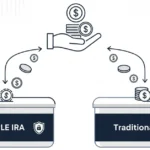Welcome to smartretireplans.com, your guide to building a secure retirement.
The decision to move abroad is often a mix of excitement, opportunity, and a bit of uncertainty. You’ve planned your visa, researched your new home, and maybe even started learning a new language. But in the midst of all that preparation, a critical question arises that can’t be overlooked: “Leaving America, what happens to my IRA?”
It’s a powerful question because your IRA is a cornerstone of your retirement security. While the prospect of managing a U.S. account from a foreign country might seem daunting, the good news is that your Individual Retirement Arrangement remains yours. It doesn’t disappear, and it doesn’t automatically lose its tax-advantaged status.
However, the rules for managing it, contributing to it, and taking distributions from it change in subtle, yet critical ways. What was once a straightforward process of putting money in and watching it grow now involves a new set of considerations related to international tax law, brokerage policies, and your own earned income.
In this comprehensive, human-friendly guide, we will break down everything you need to know about your IRA as a U.S. citizen living abroad. We’ll answer all your most pressing questions, including:
- Does my IRA move with me?
- Can I still contribute to my IRA while living abroad?
- What happens when I need to take money out?
- What about the dreaded “exit tax” if I renounce my citizenship?
Our goal is to give you the clarity and confidence to manage your IRA effectively, no matter where in the world you choose to live.
Part 1: The Basics – Your IRA Stays in America
The first and most important thing to understand is that your IRA is a U.S. retirement vehicle, and it remains domiciled in the United States. Your physical location changes, but the account’s legal location and the tax rules governing it do not.
This means a few things:
- U.S. Tax Law Still Applies: Your IRA is still subject to the same IRS rules, including contribution limits, early withdrawal penalties, and Required Minimum Distributions (RMDs) when you reach the appropriate age.
- It Does Not Move: You cannot simply transfer your IRA to a bank in your new country. It must be held by a U.S. brokerage or financial institution.
- You Can Still Manage It: With a U.S. address on file (more on that later), you can continue to log into your account, buy and sell investments, and monitor your portfolio from anywhere in the world.
Now that we have established that your IRA stays put, let’s dive into the more complex, and often confusing, aspects of managing it from abroad.
Part 2: The Contribution Conundrum: Can I Still Put Money in?
This is where the most significant challenges arise for U.S. citizens living abroad. The ability to contribute to an IRA is not tied to your citizenship, but to your earned income. The IRS requires you to have taxable compensation in a given year to contribute to an IRA.
Here’s where things get tricky for expats. Many U.S. citizens abroad use one of two main strategies to avoid double taxation (being taxed by both the U.S. and their host country):
- The Foreign Earned Income Exclusion (FEIE): This allows you to exclude a significant portion of your foreign-earned income (adjusted annually for inflation) from your U.S. taxable income.
- The Foreign Tax Credit (FTC): This allows you to claim a dollar-for-dollar tax credit for the income taxes you’ve paid to a foreign government.
The FEIE is often the more popular choice if you live in a country with low or no income tax. However, here is the catch: If you use the FEIE to exclude all of your foreign-earned income, your taxable compensation for U.S. purposes becomes zero.
And if your taxable compensation is zero, you cannot contribute to an IRA.
This is a common and costly mistake that many expats make. They enthusiastically claim the FEIE, reduce their U.S. tax bill, and unknowingly lose their ability to contribute to their IRA for that tax year. If you make a contribution anyway, it is considered an “excess contribution” and is subject to a 6% excise tax each year until the excess is removed.
A Better Strategy for Savers
For those who want to continue building their IRA, the Foreign Tax Credit (FTC) is often a much better choice. By choosing to take the FTC, you report all your foreign-earned income to the IRS. You then apply the tax credit for the taxes you paid to your host country.
- If your host country’s tax rate is higher than the U.S. rate, the FTC will likely wipe out your U.S. tax liability entirely.
- Crucially, by reporting all your income, you still have “taxable compensation” that allows you to contribute to your IRA.
This strategy is particularly beneficial if you live in a high-tax country (like much of Western Europe) where the taxes you pay abroad are equal to or greater than what you would owe the U.S. anyway.
Part 3: The Distribution Dilemma: Taking Money Out from Abroad
When you reach retirement age and want to take money out of your IRA, the process is generally straightforward, but there are still a few important things to be aware of.
- Traditional IRA Distributions: As a U.S. citizen, distributions from your Traditional IRA will be considered U.S.-sourced income and are generally taxable in the U.S. as ordinary income, regardless of where you live.
- Roth IRA Distributions: Qualified distributions from a Roth IRA (after meeting the 5-year rule and being 59½) are generally tax-free in the U.S.
However, your host country’s tax laws come into play here. Some countries do not recognize the tax-free status of a Roth IRA and may choose to tax your withdrawals. This can lead to double taxation. In these cases, a tax treaty between the U.S. and your host country may provide some relief. Tax treaties often have provisions that determine which country has the right to tax certain types of income, including retirement distributions.
It is absolutely crucial to consult a cross-border tax professional to understand how your host country treats IRA distributions and to make sure you are in compliance with both U.S. and foreign tax laws.
Part 4: Managing Your IRA from Abroad: The Practical Side
Maintaining your IRA while living abroad can present a few logistical hurdles.
Brokerage Firm Policies
Many U.S. brokerage firms have internal policies that make it difficult for them to serve clients with foreign addresses. This is due to complex international regulations and reporting requirements. If you notify your brokerage that you are moving abroad, they may choose to close or restrict your account.
Some firms, like Charles Schwab International and Interactive Brokers, are known for being more expat-friendly and have dedicated services for U.S. citizens living overseas. It is highly recommended that you contact your current brokerage before you move and, if necessary, roll over your IRA to a firm with a clear, established policy for expats.
Maintaining a U.S. Presence
Even with an expat-friendly brokerage, you may still need a U.S. address and a U.S. bank account to maintain your IRA. This is because many firms will only mail physical documents (like tax forms) to a U.S. address. A trusted family member’s address can often be used for this purpose.
Part 5: The Ultimate Step: Expatriation and Your IRA
For those who decide to take the ultimate step and renounce their U.S. citizenship, the tax implications for an IRA are significant and must be planned for well in advance.
If you are considered a “covered expatriate,” you will be subject to a one-time “exit tax.” You are a covered expatriate if you meet any of the following criteria:
- Net Worth Test: Your net worth is $2 million or more on the day you expatriate.
- Income Tax Test: Your average annual net U.S. income tax for the five years before expatriation is more than a set threshold (this is adjusted annually).
- Tax Compliance Test: You fail to certify that you have complied with U.S. tax obligations for the five years preceding your expatriation.
If you are deemed a covered expatriate, your IRA is treated as if you took a full lump-sum distribution on the day before you expatriate. The full amount in your Traditional IRA would be considered taxable income, and you would owe tax on it immediately. While there is a significant exclusion amount, this could still result in a substantial tax bill.
For this reason, planning a full or partial Roth IRA conversion before expatriating is a common strategy to potentially reduce or eliminate this exit tax.
Part 6: Navigating Tax Treaties
Tax treaties are formal agreements between the U.S. and other countries to prevent double taxation and provide clarity on tax matters. For your IRA, a tax treaty can be a lifesaver.
- Withholding: The U.S. IRS may impose a 30% withholding tax on IRA distributions to foreign residents. However, if you live in a country with a tax treaty that has a provision on retirement distributions, you may be able to get this withholding rate reduced or eliminated.
- Reporting: Tax treaties can also clarify which country has the right to tax certain income. However, it’s important to remember that as a U.S. citizen, you must still file a U.S. tax return and report your worldwide income. You would then use the treaty rules to adjust your tax liability.
Conclusion: Leaving America What Happens to My IRA?
Leaving America, what happens to my IRA? The answer is not a simple one, but it is manageable. Your IRA remains a valuable asset, and with the right strategy, you can continue to use it as a powerful tool for your retirement.
The key takeaway is that you must be proactive. Before you move, understand the rules of the Foreign Earned Income Exclusion and how it impacts your ability to contribute. Research which brokerage firms are expat-friendly, and if necessary, initiate a rollover. When you start taking distributions, work with a cross-border tax professional to understand your tax obligations in both countries.
By taking these steps, you can ensure that your move abroad is not a detriment to your financial future but a seamless transition that keeps your retirement savings secure and on track.
Can I keep my IRA if I move out of the United States?
Yes, you can. Your IRA is a U.S. tax-advantaged retirement account, and it remains domiciled in the United States. You can continue to own and manage your IRA from abroad, but you must adhere to all U.S. tax laws and regulations.
Can I still contribute to my IRA while living abroad?
This is a key issue. You can only contribute to an IRA if you have taxable earned income. If you use the Foreign Earned Income Exclusion (FEIE) and your taxable income becomes zero, you cannot contribute. However, if you use the Foreign Tax Credit (FTC) to offset foreign taxes, your income is still considered taxable, allowing you to contribute.
What are the tax implications of taking distributions from my IRA while I’m an expat?
For a Traditional IRA, distributions are generally considered U.S.-sourced income and are taxable as ordinary income. For a Roth IRA, qualified distributions are tax-free in the U.S. However, you must also consider the tax laws of your host country and any relevant tax treaties, which may affect how your distributions are taxed.
Do I need to maintain a U.S. bank account and address?
Yes, it is highly recommended. Many U.S. brokerage firms require a U.S. address for mailing tax documents and may need a linked U.S. bank account for transferring funds. You may need to use a trusted family member’s address for this purpose.
What happens to my IRA if I decide to renounce my U.S. citizenship?
If you are a “covered expatriate” (based on net worth or income), your IRA is treated as a lump-sum distribution on the day before your expatriation. This could result in a significant one-time “exit tax” on the entire value of your Traditional IRA. For this reason, it is crucial to seek professional tax advice well in advance.
Are there specific brokerage firms that are better for U.S. expats?
Yes. Many U.S. firms have strict policies regarding accounts for non-residents. However, some firms like Charles Schwab International and Interactive Brokers are known for being more expat-friendly and have dedicated services for U.S. citizens living overseas. It’s a good idea to check your brokerage’s policies before you move.














